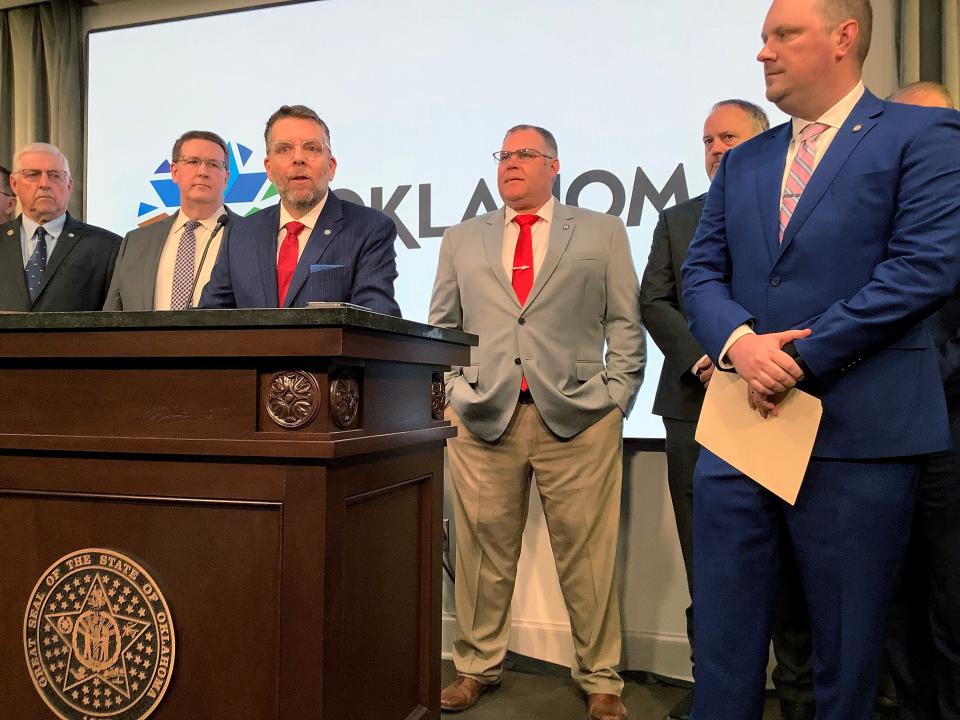Attorney general hiring staff to enforce laws on controversial pharmacy corporations

- Oops!Something went wrong.Please try again later.
As Attorney General Gentner Drummond prepares to take over enforcement of laws regulating giant pharmacy benefit manager corporations, his office is staffing up.
Five positions posted on the state's job board include listings for attorneys, agents and an analyst focused on making sure the industry follows Oklahoma laws.
During its regular session this year, the Legislature voted to make a change in enforcement authority. The Oklahoma Insurance Department had been given the job when Pharmacy Benefit Managers (PBM) regulations were first adopted four years ago.
Phil Bacharach, spokesman for the attorney general, said Drummond “is determined to discharge his new PBM enforcement duties in a way that protects consumers and holds accountable any bad actors in that industry.”
What are PBMs?
A pharmacy benefit manager is a third-party administrator that manages prescription drug benefits for health insurance plans, many of which are provided by employers. According to the National Association of Insurance Commissioners, the three largest PBMs control about 89% of the market, serving about 270 million Americans. They are CVS Caremark, a subsidiary of the CVS drugstore chain; Express Script, an independent publicly traded company; and OptumRx, the pharmacy service segment of UnitedHealth Group Insurance.
PBMs negotiate with drug manufacturers and pharmacies to set drug prices, and then process claims and reimburse pharmacies for dispensed prescriptions.
Oklahoma's law prohibits PBMs from steering customers to specific pharmacies in an attempt to prevent monopolization, and is meant to protect Oklahomans from other harmful business practices.
More: Jail trust ditches private legal representation to use district attorney's office instead

One of the most visible and persistent issues with PBMs has been Oklahoma's fight with CVS Caremark over whether people can receive 90-day prescriptions instead of refills every 30 days. Insurance Commissioner Glen Mulready and state lawmakers have repeatedly, and publicly, chastised CVS Caremark over letters it sent to customers that they said contained inaccurate and misleading information.
Mulready issued fines against the company for telling customers that Oklahoma's pharmacy choice law prevented them from allowing 90-day refills unless those prescriptions were filled with CVS itself.
The issue also has reached the halls of Congress, where several bills have been filed to further regulate the industry.
'They're not feeling the pain'
Despite Mulready's issuance of over $3.5 million in fines and defense of the law in federal court, legislators have criticized his office for not doing enough. In a committee hearing this year, state Rep. Marcus McEntire said data from hundreds of thousands of complaints show the PBM law wasn't being appropriately enforced.
"It wasn't until recently that the Insurance Department really started to enforce the law. It's still lagging. We need aggressive enforcement of this law because if we don't, many more of our independent pharmacists are going to go out of business," said McEntire, R-Duncan. "Until we start busting up some of these efficient monopolies, it's going to continue. The best way we can do that is through enforcement. It needs to be enforced quickly, because it's just not happening. They're not feeling the pain."
Mulready said he's spoken to Drummond about the changeover and vowed to work with his office to ensure a smooth transition. However, he defended his work so far.
More: Oklahoma House committee to hold hearing on rape allegations at state prisons
"I think the Legislature thought something more should be done. I think some would express that they weren't happy that PBMs were still in business," Mulready said. "I think that's a little over the edge, I guess."
After lawmakers approved the bill that took enforcement away from the Oklahoma Insurance Department, Gov. Kevin Stitt vetoed it, saying it moved authority away from the subject-matter expert.
"Such a transition is opposed by the duly-elected and capable insurance commissioner, Glen Mulready, and would come with an avoidable and unnecessary fiscal impact," Stitt wrote.
Lawmakers overrode his veto in the last week of session.
Oklahoma's independent pharmacies pushed for more aggressive enforcement. Their advocate at the state Capitol, Greg Piatt, said PBMs are some of the largest corporations in the United States and this fight needs the "authority and weight" of a state attorney general's office. All the more important, he said, because Oklahoma is on the forefront of reining in an industry that's been accused of harming local businesses and damaging the relationship between pharmacists and their patients.
"In order to get them to fully follow the laws that Oklahoma has passed, I believe it's going to take an attorney general with a much bigger hammer," Piatt said. "If it's enforced here, there's hope for the rest of the country."
This article originally appeared on Oklahoman: Pharmacy benefit corporations now under attorney general enforcement

